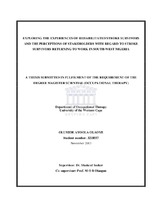| dc.description.abstract | Stroke has been identified as a global cause of neurological disability with a resultant burden shared not only by the survivor but also by the society. The resumption of one’s role as a worker after having a stroke is an important rehabilitation goal. South-West, Nigeria has experienced high incidence and prevalence of stroke leaving a quarter of survivors with severe disability and difficulty in community integration after rehabilitation. As a disability resulting from a stroke could be viewed as being a dynamic interaction between the health condition and contextual factors, a client-centred approach should be focal to stroke management to facilitate return to work. Therefore, it became necessary to explore the return to work process from stroke survivors and stakeholder’s perspective in order to understand the challenges stroke survivors face while adapting to their worker roles, to improve service design and delivery as well as to facilitate the return to work after having a stroke. The study was aimed at exploring and describing the experiences of rehabilitated stroke survivors and perceptions of stakeholders about stroke survivors returning to work in South-West Nigeria. A qualitative research design was used to explore these experiences and perceptions from nineteen participants that comprised of nine stroke survivors, two key informants (rehabilitation specialists) and eight caregivers of the respective stroke survivor. Two methods of data collection were used by the researcher to access the perceptions and experiences of the participants. The researcher made use of focus groups with the caregivers while in-depth interviews were conducted with the stroke survivors and rehabilitation specialists. One pilot testing in-depth interview and eleven in-depth interviews were conducted with the stroke survivors and rehabilitation specialists while two focus group discussions were held with the eight caregivers consisting of four participants per group. The data from the study was analysed using thematic analysis. All data were managed manually. The study was further aimed at obtaining participants` perceptions and experiences of barriers and facilitators as well as adaptation processes that influenced the stroke survivors’ ability to resume their worker role. The findings were revealed in five themes. Theme one and two describes the barriers experienced by the stroke survivors while returning to work in the form of loss of former self and returning to work is a struggle. The resumption of the previous worker role by the stroke survivors was construed to be a contest which entails a struggle between the survivor, survivor’s job characteristics, rehabilitation intervention and stigma from the society. Poor access to rehabilitation interventions, inadequacy of treatment and poor insight of the stroke survivor regarding condition, job characteristics as well as social stigma related to the condition were observed as factors that posed great challenges to the participants. Theme three describes the factors that facilitated the resumption of the worker role for the stroke survivors. Engagement in rehabilitation as well as social support enabled the stroke survivors to overcome the barriers and returning to work. Theme four describes the adaptation strategies that enable the return to work for the stroke survivors. Theme four was described by an intrinsic adaptation process that involves the acceptance of the illness and being motivated to return to work and an extrinsic adaptation process that involves gradual work exposure, workplace and home adaptation. Theme five describes the participants’ perception of changes needed in the rehabilitation services and policies that would facilitate the quick return to work of the stroke survivor. Promoting participation of stroke survivors in work through government policies was observed to be a necessary recommendation for the study. These were seen to be achievable through the improvement of rehabilitation resources, enabling access to rehabilitation through financial assistance, change of the regulatory environment to accommodate for the disabled and the initiation of health promotion through public awareness campaigns in the community regarding stroke. The Person Environment Occupation model of occupational performance was used as a framework to interpret the findings of the study; the barriers, facilitators and adaptation process was placed into perspectives as they impacted on the experience of the stroke survivors ‘resumption of their worker role. The resumption of the worker role of the stroke survivors was observed not only to be influenced by the individual characteristics of the survivors but also by the environmental context within which the return to work process took place. | en_US |

